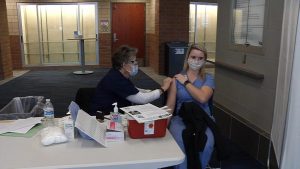Local First Responders Get First Dose of COVID-19 Vaccine
For two weeks in January, Minnesota’s largest high school became a makeshift clinic, dedicated to serving those responsible for protecting all of us.
“We’re receiving the Moderna vaccine through Hennepin Public Health and Hennepin Healthcare,” said Plymouth Deputy Police Chief Erik Fadden. “And over the last couple weeks, we have reached out and coordinated with 43 different police and fire departments within this area.”
Mackenzie Phenow of the Osseo Fire Department is part of that mix. She was one of more than a thousand first responders to receive the first injection of the COVID-19 vaccine at Wayzata High School.
“We are going into many nursing homes and assisted livings in our community with very vulnerable people who we could be passing this onto,” Phenow said. “So it’s very important to me to be getting this to make sure I’m not spreading it to anybody else.”

Mackenzie Phenow of the Osseo Fire Department receives her first dose of the COVID-19 vaccine.
According to research from Harvard Health, it’s uncertain yet if getting the vaccine will prevent someone from infecting others. Clinical trials of the Pfizer and Moderna vaccines found that both do a good job preventing symptomatic COVID-19. However, the trials did not measure whether a person who is vaccinated is less likely to spread the virus to someone else.
A visit from the governor
Phenow received her shot on the same day Governor Walz and a contingent of local officials paid a visit to the site.
The group wanted to get a closer look at how Hennepin County’s COVID response task force is administering the vaccine.
During this pandemic, first responders still go out every day, knowing they have a job to do, and the risks involved.
“It’s taken its toll and it’s been really tough,” Phenow said.
“It’s made a big difference in the amount of medicals that Osseo Fire responds to for sure,” Phenow said. “We’ve had to draw back a lot just cause we don’t need to be going into places we don’t need to and potentially spreading COVID.”
Meanwhile, everyone receiving their shots at this clinic will come back in 28 days for their final dose of the vaccine. It’s a step that will help their departments return to a sense of normalcy.
“There’s this light at the end of the tunnel right now,” Fadden said.



